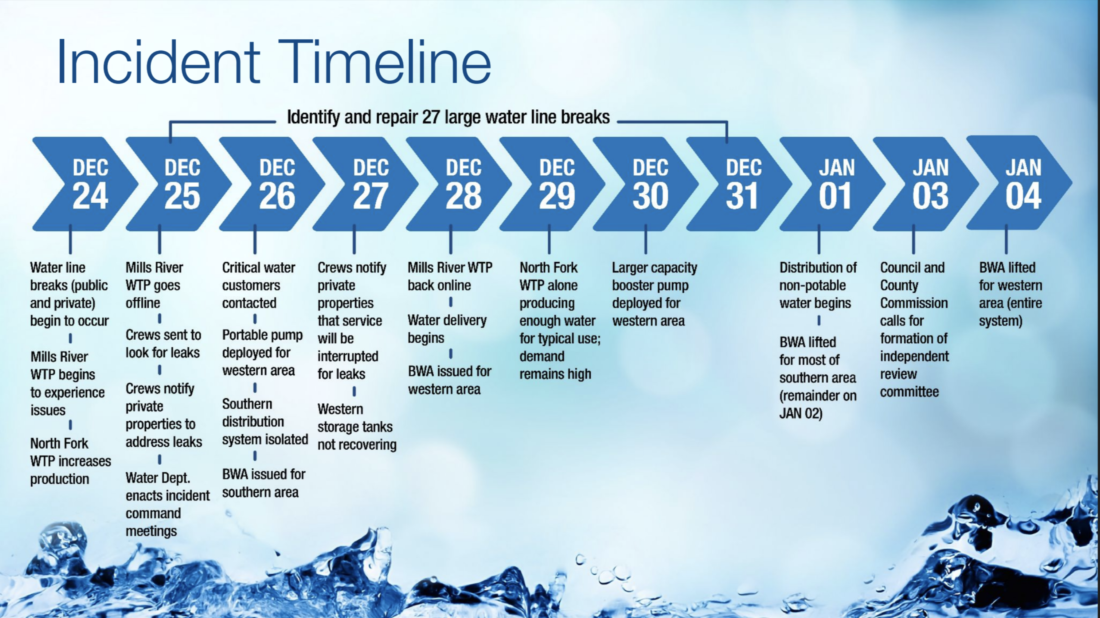How many people does it take to figure out why roughly 38,500 Asheville and Buncombe County residents didn’t have water over the holidays? Nine, according to Asheville City Council.
During its Jan. 10 meeting, Council voted unanimously to create an independent review committee to explain the cause of the water outages that started Dec. 24 and lasted through Jan. 4. The new nine-member board will include two residential water customers, one commercial customer, one emergency response or disaster relief professional, two communications professionals and three experts on public water systems.
“There were a lot of complexities within our water system that contributed to the outages,” said City Manager Debra Campbell. “And we want to say, and we’ve said it a couple of times, we regret that this happened and we are taking immediate and long-term steps to prevent and minimize this from occurring again.”
As presented by Assistant City Manager Ben Woody, the new committee will analyze the city’s existing infrastructure and determine updates needed to prevent future outages. The group will also examine the city’s emergency response and communications efforts. According to a city timeline of the events, the first waterline breaks occurred on Dec. 24, but city officials did not hold a press conference until Dec. 28.
Council member Kim Roney said she wanted a deeper understanding of how the city was communicating the outage to non-English-speaking and other populations that may have limited access to the city’s emergency alert system.
“From my experience helping neighbors with nonpotable water in the south and west and in the county, one of the things that I realized is that we had some gaps in communication: folks speaking Spanish, Russian and Ukrainian, folks in the deaf and hearing-disabled community,” Roney said. “I know, we’re not going to get into all of those today. But as we get in from that 50-foot view closer, I think those are some of the questions that still linger.”
The Buncombe County Board of Commissioners will be responsible for appointing two of the committee seats, with Council appointing the remaining seven. According to the city’s timeline for the committee, Council is scheduled to appoint its members Tuesday, Jan. 24, with Buncombe County appointing its members Thursday, Feb. 7.
The first committee’s update to Council is expected in mid- to late February, with a final report and presentation slated for mid-May.
Council appoints Jesse Warren to school board
After conducting interviews with four candidates for the Asheville City Board of Education, a majority of Council members appointed Jesse Warren, a retired Asheville City Schools junior ROTC instructor and retired U.S. Marine Corps first sergeant, to the board’s vacant seat. The position had become open after school board member Peyton O’Conner resigned in December, citing transphobic rhetoric during public comment at recent board meetings.
Council member Maggie Ullman was the sole member to vote for another candidate, Pepi Acebo, while Sage Turner, who was participating by phone, was not able to take part in the vote remotely.
Although the city school board is transitioning to an elected body, with four of its seven members picked by voters last year, its three remaining members — including O’Conner — had been appointed by Council in 2021 and are slated to serve through 2024. It thus fell to Council, and not voters or other school board members, to choose O’Conner’s replacement.
Acebo finished fifth in last year’s general election, falling short a seat on the board by roughly 200 votes; Warren finished sixth, roughly 1,100 votes short of winning the seat. In December, the Asheville City Association of Educators acknowledged that Acebo “received the most votes of any candidate who did not win a seat on the school board,” but said that it continued to endorse Warren for the position.
In a Facebook post, former candidate for Asheville City Council Nina Tovish criticized the Council members who voted for Warren.
“Tonight I was deeply disappointed that City Council chose to impose their own choice over that of about 8,700 actual voters who voted for school board candidates last November,” she wrote. “Democracy is far from perfect. But if you pick and choose which free and fair election processes you’ll abide by, well, that puts you in some pretty bad company.”




I agree with Nina Tovish (and with Maggie Ullman’s vote). While I’ve personally met Mr. Warren and know of his longtime commitment, Mr. Acebo not only received more votes, he has previously written very passionately and eloquently about the needs of our children and schools. At the very least, I believe there should have been a special runoff election. Two very strong choices, though…Mr. Acebo should be moved to the front of the line should there be another vacancy, and should he still wish to serve.
So, you have an alternative process suggestion and an opinion. Got it.
If we’d wanted Tovish view we would have voted for her.
Asheville mayor’s response to the water crisis is to point out to us idiots that it’s really not her fault & it’s all political anyway & her hands are tied because of Republican legislation in Raleigh. So there.
https://youtu.be/9_9wEy0JxRQ?t=7988
#avlnews #asheville #avlwater #ncpol #ncga
Regarding the water outage…it seems like a pretty good idea to look at the current infrastructure capacities and capabilities. Most people would have thought the City Leaders would like to know this before launching new or additional services. If water lines are the subject of this expose, one must not forget to look into the other elephant in the room…sewage lines !
I heard that the first agenda item is to set up some subcommittees.